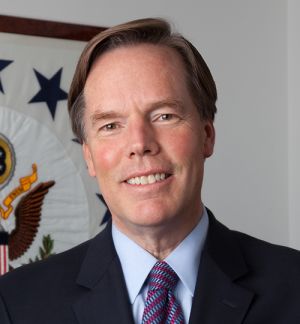President Obama has the chance to lay out a creative foreign policy plan for the end of his second term.
FOR A president with impressive foreign policy successes in his first term, Barack Obama has had a difficult year and a half on the global stage since his reelection. The White House faces growing international criticism that it is not leading assertively on daunting crises, from Russian President Vladimir Putin’s aggression in Ukraine to humanitarian disaster in Syria to China’s increasingly troublesome pressure on American friends in the East China and South China seas. Some of this criticism is unfair, but the Obama team can’t afford to ignore it.
Obama could turn the table on his critics by outflanking them. He could conclude that now is the time to embrace a more assertive American global leadership role in the wake of Crimea. He has all the power he needs to do so. Even if the Democrats lose control of the Senate in November, the Constitution gives the president ample latitude to lead in foreign policy. He also has the necessary experience. Obama demonstrated toughness in his first term in going after Osama bin Laden and vision in asserting that America’s vital interests dictated a pivot to the Asia-Pacific in this century. In John Kerry, he has an experienced secretary of state who has earned global respect in his first full year on the job.
And he has the perfect stage to announce a reset of his international strategy. Obama aides point to the May 28 West Point commencement as the place where he will answer his growing army of critics. What might Obama say there to chart a vigorous comeback for American global leadership?
He could start by challenging Congress to fully fund a strong diplomacy and military to meet the many tests ahead. It doesn’t make sense to return the Army to its lowest personnel levels since 1940 or to delay in rebuilding an American Foreign Service hollowed out by decades of congressional disinterest. Not when Putin and Xi Jinping are flexing their muscles in Europe and Asia. The wise, 93-year-old former Secretary of State George Shultz told two Harvard colleagues and me recently that it was vital for Ronald Reagan to first rebuild America’s core strength before defeating Soviet power in the last great struggle of the Cold War. The same is true now — shoring up American diplomatic, economic, and military power is a necessary precondition to contain Russian aggression and Chinese adventurism.
Obama could also decide to deploy more creatively the symbols of American presidential power, as FDR, JFK, and Reagan did so memorably at moments of similar international challenge. He could call a NATO summit in Brussels when he visits in early June to give unequivocal public backing to uneasy East European allies at a time when the Russian bear is back prowling in their neighborhood. His call for a stronger NATO would be heard and understood in Moscow because if Putin respects one thing, it is power.
Obama has other opportunities to restore America’s leadership position. In the Middle East, successful Iran negotiations that blocked Tehran’s route to a nuclear weapon would go a long way to boost America’s international standing and reward Obama’s faith in the power of diplomacy. In India, last week’s stunning victory of Narendra Modi and the BJP Party should convince Obama to make restoring our once strong strategic ties with New Delhi a priority. Obama could also reemphasize relations with emerging powers Brazil and Indonesia when those two countries conclude presidential elections this autumn.
Like all presidents, Obama has stumbled on some key foreign policy tests. But he now has the chance to build on his past successes by pivoting to a stronger global leadership position. Contrary to those warning he is already a lame duck, that is just not true in foreign policy, where the role of the United States remains indispensable. Indeed, Obama has 31 more months to lead the world’s most powerful country from the world’s most powerful office.
Burns, Nicholas. “Obama needs to reset his international strategy.” The Boston Globe, May 22, 2014





